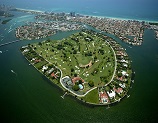RISMEDIA, May 10, 2006—(KRT)—Push a pile of paper and bring in the dough.
Sounds like a sweet gig. But ask real estate agents, especially new ones, and they'll tell you it's tough out there.
The joke is old, but it goes something like this: A shopper at a checkout counter wants to write a check. "Sure," the clerk says. "I'll just need to see your real estate license."
"You mean my driver's license?" the woman says.
"Well, ma'am," the clerk says. "Not everyone drives."
Not everyone is a real estate agent. But it may seem that way.
Membership at the Richmond [Virginia] Association of Realtors is up nearly
60 percent in five years.
About 90 people attend the association's monthly new-membership orientation.
Many got in the business to ride the wave of the hot housing market.
Some are pulling in six figures a year. But the money is not easy, agents and brokers say. It takes work, dedication, odd hours -- and thick skin.
Many don't make it. In good times, turnover is high. With the housing market cooling, even more churn is expected.
Two-thirds of real estate agents "are always in motion," said Bill Porter of Porterhouse Properties in Richmond.
"One-third is coming, one-third is going and one-third stays." Among those who stay, "20 percent do 80 percent of the work."
Most agents are independent contractors. They knock on doors, send mailers and let people know they are in business, he said.
"There are no secret agents in this business." But 80 percent act as if they are, and they won't make it, he said.
Porter has been in real estate since 1975 -- long enough to see mortgage interest rates at 18 percent and at 6 percent.
Regardless of the rates and the times, people are always coming into Richmond and leaving, he said. That means they are buying or selling houses.
"Richmond is a great corporate gypsy market," Porter said.
Capital One Financial Corp., the area's largest employer, has shrunk ranks over the past couple of years. Philip Morris USA added to the local payroll. MeadWestvaco will start moving people here this summer.
"The corporate gypsy market will keep the bubble away from Richmond," Porter said.
While agents' sales commissions are negotiable, 6 percent is standard. On a $200,000 house, that is $12,000 off the top.
Half generally goes to the buyer's agent and the other to the listing agent. But realty firms get a cut -- as much as half -- of those takes.
Top agents get better splits, with some keeping up to 90 percent. Still, most everyone has business, advertising and licensing fees.
An agent could sell $1 million worth of real estate and net only $25,000, Porter said.
In 31 years in the business, he has never seen home prices appreciate as much as they have in the past couple of years.
The higher the prices, the higher the commissions.
"There are some people in Richmond making tons of money." But
they are the exceptions, he said.
Anyone getting into the business needs six months of income set aside,
Porter said. "And fire in their belly."
Some of the best are former teachers and nurses, he said. They know how to work hard and with all kinds of people.
Muriel Rodriguez, in business development for an engineering firm by day, is an agent by night and weekends.
She uses her Spanish to reach out to Hispanics. "Otherwise, it would be really tough."
Rodriguez lives in New Kent County but does most of her real estate work in Chesterfield County, which has a growing Hispanic community.
"I really enjoy it. I feel like I am doing a service. There aren't
that many Spanish-speaking agents who can communicate with Hispanics and
Latinos."
She worries that her clients are being priced out of the market.
"I work at it every opportunity I get, but the market is slowing because prices are going up so much."
Her clients might pre-qualify for a $150,000 loan, for example. "Last year, there were a lot of houses to choose from, but you had to be quick."
This year, there aren't many for that price.
Rodriguez, an agent with Kenny Wilbourne Realty, has been licensed for
2 1/2 years. "To really get it going has been tough. It is such a
slow start."
Ken Rubert, an agent with Hermitage Realty, can empathize. A mechanical
engineer for heavy industry, he was restructured out of a job once, then
laid off again from a chemical conglomerate along with the entire American
contingency.
"I was in my upper 50s, so it was getting more difficult to find a job."
He got his real estate license and signed up for a course at the Multiple Listing Service in Richmond. The instructor was from his former company.
Each was surprised to see the other in real estate. "I'm starving," Rubert told his colleague.
"Do some estimating for me," said the friend, who runs a mechanical contracting business plus a real estate brokerage.
"I'm hanging in there," Rubert said. "But it would be better if I could get more clients and more mechanical jobs."
The first broker he worked with tried to warn him. "I was told it was very competitive, and the majority of agents make $20,000 or less a year. Well, that is very true."
A. Terry Crawley, an agent since 1977 and a broker since 1988, said he has seen hundreds of people come and go in real estate.
"You just have to get out there and work your butt off," he said.
Crawley, principal of Robinson-Harris & Co. Inc., said he has done it all, including home sales. He has moved into property management and investment property.
"When you're working with investors, you're selling them income, a rate of return on their investment," he said.
They don't get emotional or worked up about the color in a kitchen as a homebuyer would, Crawley said.
Joan Peaslee, one of the top agents at Prudential James River Slater, said she likes residential sales.
"I just like a good house," she said.
Peaslee, a former teacher, has cornered the market in the Bellevue neighborhood in North Richmond, but she sells and lists in all areas.
"I have to like the people I work with," she said. "If I like you, then I trust you, and it's not work."
She recalls getting into real estate in the mid-1980s. About 200 people were in her class.
Only four or five are still in the business, she said.
"We're just out there, like moving targets at the State Fair," she said. "I get shot down, then pop up and here I come again."
Copyright © 2006, Richmond Times-Dispatch, Va.
Distributed by Knight Ridder/Tribune Business News.
see more
press releases
Miami Real Estate
Newsbytes











